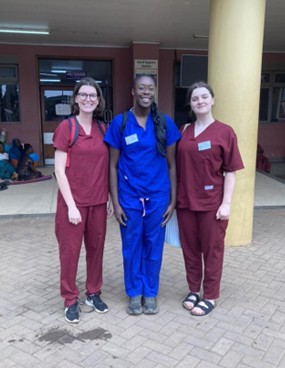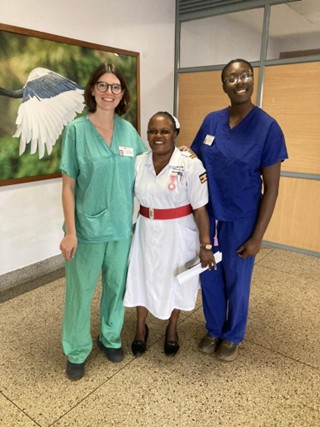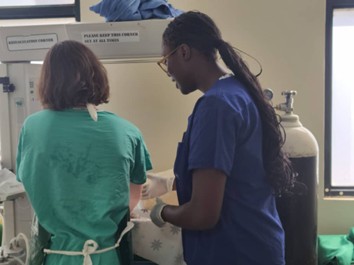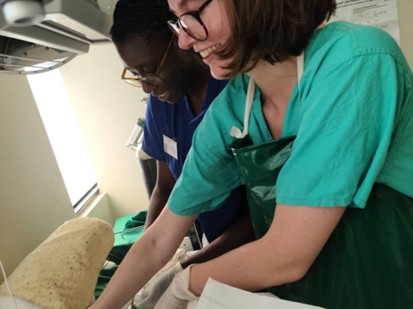By Jessica Webb
Jessica Webb is a medical student at the University of Cambridge. She completed a six week ethical elective in Uganda as part of a project that is trying to reduce the maternal death rate from preventable complications of pregnancy and childbirth. Here she explains more about the experience and the learning she got from it.
“I wanted to understand the realities of delivering healthcare in a low resource setting, and how the challenges are addressed in innovative ways. It was important that my elective be ethical, and I wanted to work on issues that are important to the local people.
I hoped to see healthcare being practiced in a setting very different from the one I am accustomed to in Cambridge. I anticipated that this would challenge me to step outside of my comfort zone, adapt to unfamiliar systems and learn to work effectively in a new cultural and clinical environment. I hoped to not only expand my clinical exposure, but also strengthen my confidence, resilience and adaptability – skills that will be important as a junior doctor.
I also hoped to gain an understanding of the challenges faced by healthcare professionals in a low resource environment, such as limited equipment, high patient numbers and workforce pressures, and to learn about the resourceful and creative ways in which these are tackled. Alongside this, I wanted to make a contribution to the project’s broader aim of improving maternal and neonatal outcomes.

The project
I participated in the CGHP-supported Maternal and Neonatal Health project in Kampala, an ongoing collaboration that is trying to reduce the maternal death rate (currently four times the WHO target in Uganda). Many of maternal deaths in Uganda are from preventable or treatable complications of pregnancy and childbirth, with the four leading causes of maternal death being postpartum haemorrhage, obstructed labour, infection and pre-eclampsia. An audit conducted at Kawempe National Referral and Mulago Specialised Women and Neonatal Hospitals showed significant gaps in guideline adherence and clinical documentation. In response, a joint team from Cambridge and Kampala developed a programme of training designed to address these gaps.
Shortly before I travelled to Kampala, the training was delivered to the doctors and midwives. The training focused on major obstetric emergencies, including postpartum haemorrhage, maternal sepsis and pre-eclampsia, drawing directly on the findings of the audit and the new guidelines that had been developed. The aim of this training was to strengthen the capacity of healthcare providers to manage these very common but life-threatening maternal conditions, and to align actual practice on the labour ward with clinical guidelines. The sessions were interactive, and involved presentations, guided group discussions and simulations to support active learning. A key feature of the training was the use of structured checklists, which aimed to improve consistency of practice and support decision-making in high-pressure clinical situations.
The training concluded with a structured feedback survey to capture participants’ experiences and suggestions for improvement. Our elective was embedded within this wider project, with our role centred on analysing the feedback, encouraging checklist use, and assisting clinical teams on the labour ward.
Aims of the elective
For my fellow student Elizabeth Neri and I, our aim was to build upon the work completed by the team before us, ensuring that the training delivered in Kampala translated into meaningful and sustainable improvements in clinical practice. Specifically, we aimed to support the implementation of the guidelines and to help solidify the lessons learnt from the training sessions in day-to-day obstetric care.
Our first objective was to assess how the training had been received. We reviewed and analysed the written feedback completed by participants at the end of the training. We then collated our findings into a structured report, highlighting key strengths of the training, and areas that could be improved.
Secondly, we investigated the impact of the training on clinical practice on the wards. This involved observing whether guideline recommendations were being followed in the management of obstetric emergencies, including utilisation of the checklists introduced during the teaching, and encouraging their wider use. By gathering this information, we hoped to provide valuable insights to the project team, enabling them to tailor future interventions.
We also wanted to learn directly from the doctors and midwives by engaging in hands-on clinical work. We assisted on the labour ward and in theatres, supporting triage, undertaking practical procedures, monitoring and assisting with labour and deliveries, and participating in perioperative care. This not only enabled us to contribute to the clinical workload but also allowed us to gain a deeper understanding of the challenges faced by healthcare providers in a resource-limited setting.
Finally, an important personal objective was to broaden our perspective on healthcare delivery by working in a very different context from Cambridge. This provided invaluable exposure to global health in practice, strengthening both our clinical and professional development.


My role and what I learned
My main tasks combined both project-related responsibilities and direct clinical experience. My first responsibility was to analyse the large volume of written feedback collected from participants about the training sessions. I reviewed the responses, summarised common themes, and produced a report highlighting strengths and areas for improvement. This ensured that the trainers and project leads had clear insights to guide future iterations of the programme.
Alongside this, I was involved in encouraging the practical uptake of the training, particularly the use of the newly introduced checklists. By being present on the wards and integrating into the clinical team, I was able to remind doctors and midwives about the checklists.
Clinically, I assisted on the labour ward and in theatres. I was involved in triaging patients, clerking, monitoring women in labour, supporting deliveries, and assisting with perioperative care. These experiences gave me valuable hands-on exposure while also helping to relieve some of the clinical workload.
One of the most striking things about healthcare delivery in Uganda was the level of resourcefulness shown by staff in the face of limited supplies. For instance, I saw gloves used in multiple innovative ways – from acting as tourniquets, to tying umbilical cords, and even as makeshift catheter bags for neonates. This adaptability was impressive, and the flexible, can-do attitude of the doctors and midwives was inspiring.

It reminded me not only how fortunate we are in the UK to practise in a resource-rich setting but also highlighted how much we can learn from colleagues working effectively under such constraints.
The hospitals were extremely busy. This sometimes created an overwhelming environment, where clinicians were under immense pressure to deliver care quickly. As a result, there was often little privacy for patients, a sharp contrast with what I am used to in the UK. I also noticed cultural differences in the doctor-patient relationship, which tended to be more paternalistic, with less emphasis on obtaining informed consent than in the NHS.
At the same time, I was struck by how many aspects of healthcare delivery were familiar. Ward rounds were run in a similar way, medical students were taught in a similar structure, and the core management principles in obstetrics were very much aligned with UK practice. This balance of difference and similarity gave me a deeper appreciation for both the universality and the adaptability of medicine across contexts.
Challenges and rewards
Adjusting to an environment that was initially quite overwhelming was the most challenging aspect of my elective. The sheer number of patients was very high, meaning that the pace of clinical work had to be very fast. At times, this meant that the care delivered seemed less compassionate and patient-centred than I am used to seeing in the UK. Observing women go through labour without access to pain relief was particularly difficult, and it took time to come to terms with the different expectations and practices around childbirth in this setting.
Nevertheless, these challenges made the most rewarding aspects of the experience more meaningful. I found it satisfying to realise that I could adapt, integrate into the team, and make a useful contribution to the clinical workload. Contributing to the ongoing maternal health project, particularly through analysing training feedback and encouraging the use of checklists, gave me the sense that I was adding value that will hopefully last beyond my placement. Most rewarding of all was the opportunity to learn from the doctors and midwives, whose resilience and resourcefulness left a lasting impression on me.
Personal and professional development
This elective was an enormously enriching experience that has contributed to my personal development in several ways. One of the most important areas of growth was in cultural competency. Living and working in a different environment, with its own customs, expectations, and challenges, helped me to appreciate the importance of cultural sensitivity and to adapt my behaviour accordingly. I became more attuned to how cultural context shapes both patient care and team dynamics, a lesson that will be important when working with diverse populations in the UK.
My communication skills also developed. In a busy and sometimes overwhelming environment, I learned to communicate more clearly and efficiently with colleagues and patients. This included adapting to different levels of health literacy and learning to pick up on non-verbal cues when language barriers were present.

Perhaps the most rewarding personal development was in my confidence. Being placed in an unfamiliar environment forced me to adapt and integrate into a new team quickly. The knowledge that I was able to do so has given me greater confidence in my ability to face challenges and handle uncertainty and change.
Professionally, this elective had a profound impact on my clinical training and future aspirations. I gained extensive exposure to obstetric patients, with the opportunity to practise and refine practical skills such as venepuncture, cannulation, catheterisation, and abdominal and vaginal examinations. I also had time assisting in theatre, which increased my confidence in the perioperative environment.
I developed a much deeper understanding of the management of obstetric presentations, from triaging women in labour to recognising and responding to emergencies such as pre-eclampsia and postpartum haemorrhage. This knowledge has strengthened my foundation in obstetrics, a specialty that I am considering pursuing.
Beyond the clinical skills, the experience broadened my perspective on global health. Working in a resource-limited setting gave me insights into the challenges that shape maternal outcomes worldwide. It has inspired me to pursue global health further in my career.
I had a multitude of wonderful experiences during my elective, so it is difficult to choose just one! However, the experience that stands out most took place on my last day in Kampala, when I had the privilege of delivering a baby for the first time under the guidance of the midwives. It was the mother’s first baby, and she was understandably nervous but also visibly excited to meet her baby.
The atmosphere in the room was very special – surrounded by supportive midwives, it felt empowering to be part of an all-female team encouraging the mother through each stage of labour. There was a strong sense of solidarity and shared purpose, with everyone focused on helping her through a daunting yet transformative time. When the baby was safely delivered, I had the chance to hold the newborn and congratulate the mother, who was overcome with both relief and joy.
I felt quite emotional after this – it was such a privilege to share such an intimate experience with the mother and highlighted the universal joy of bringing new life into the world, wherever you are in the world.
Making lasting changes
This elective is unique because it is not a one-off placement, but part of a long-standing, collaborative partnership between Cambridge and Kampala. This continuity allows each group of students and clinicians to build upon the work of those before them, creating sustainable impact rather than isolated interventions.
The project I was part of is special because it is firmly grounded in local priorities, with training and guidelines developed in direct response to audits carried out at Kawempe National Referral and Mulago Specialised Women and Neonatal Hospitals. This makes the work highly relevant and applicable to day-to-day practice. Additionally, the training emphasized learning through interactive simulations and introducing practical tools such as checklists, which empower local teams to deliver safer, more consistent care. As students, being able to contribute to such a collaborative, ethical, and impactful initiative, while also learning from Ugandan colleagues, made the experience particularly meaningful.
We expect that the training will have a long-term impact on the care delivered at both hospitals. Our presence on the ward meant that we could reinforce key messages from the teaching. In particular, we highlighted the importance of filling out the checklists to the doctors and midwives, which are designed to standardise care in obstetric emergencies. This served as a useful reminder of the training that they had received and prompted them to follow the guidelines. With further encouragement from local trainers, the use of the checklists will hopefully become routine, improving the quality and consistency of the care delivered and ultimately improving maternal and neonatal outcomes.
Additionally, the report that we compiled on the feedback from the training provided a useful summary highlighting the strengths of the training as well as areas for refinement. This will assist in the development and improvement of future training sessions, ensuring that the training is relevant to the needs of the staff it’s designed for.”
Jessica’s trip was made possible by funding from the Thriplow Charitable Trust. Find out more about the Ethical Elective scheme or contact us at info@cghp.org.uk
Return to blogs
